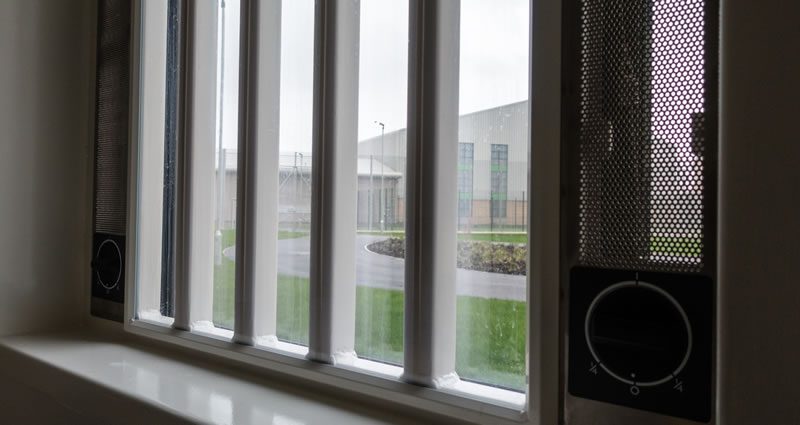Ballots behind bars: Committee backs extending prisoner voting rights in Wales

The Assembly’s Equality, Local Government and Communities Committee was tasked as part of proposed electoral reforms to consider whether prisoner voting rights should be extended.
Following a legal challenge, prisoners who are released on licence, are held on remand or have committed certain offences (failing to pay fines, contempt of court) are already allowed to vote.
“No doubt many will believe that giving even one more prisoner the vote is a step too far; whilst those who support full enfranchisement will be disappointed we have not been bolder. In recommending the vote for those sentenced to less than four years we have recognised the evidence to our inquiry, public opinion and the different views of Committee members.”
– Committee Chair, John Griffiths AM (Lab, Newport East)
The report produced by the committee outlines several recommendations, including that prisoner voting rights in Senedd and local elections should be extended to all those serving sentences in Wales of less than four years, as well as 16-17-year-olds being held in custody on the same basis as adult prisoners if/when the voting age is lowered to 16.
The committee report notes that only devolved elections are covered, so General Elections, EU or a UK wide Referendum would not come under this.
Committee members Mohammad Asghar AM (Con, South Wales East) and Mark Isherwood AM (Con, North Wales) disagreed with the Committee’s recommendations.
In terms of practicalities, the Committee recommended that prisoners register to vote in their home constituency (i.e. by using a previous address or a declaration of local connection). Voting would be done by post or by proxy.
The Committee didn’t recommend hustings within prisons, though they concluded it would be beneficial for more politicians to visit prisons and speak to prisoners.
Interestingly the committee also wants to see an informed electorate, with it specifically noting: “We recommend that the Welsh Government discuss and seek agreement with the UK Government on providing access to Welsh media, both print and broadcast for those prisons with a sizable Welsh population”
It is unclear what is defined as ‘Welsh media’ and if ‘print’ would mean printing off the likes of Wrexham.com/Election2017/, or our tweets or just ignored.
AM’s appear to have an outdated and idealised view of how ‘newspapers’ operate in 2019 with the report stating (our emphasis): “Candidates are able to disseminate leaflets to all electors on the electoral register, and we believe that prisoners should have the same access to this sort of material. This is of particular importance for local elections, where prisoners may be resident in prison outside their home area, and will not necessarily have access to local newspapers, which would provide them with an opportunity to keep updated with political developments at home”.
The need for information is clearly stated in the report, with Welsh prisoners held in English prisons being a specific concern. Welsh prisoners at HMP Eastwood Park (Gloucestershire) have no access to any Welsh broadcast or print media, with it noted “Prisoners we spoke to had no idea of the change in First Minister or other political developments since they had been imprisoned”
The committee added, “We raised this with prison staff, who advised that they had a limited number of television channels and that they could tune to Welsh channels but only if this had the support of the majority of prisoners. At the very least, we would like to see Welsh newspapers available in the library at Eastwood Park and other prisons where there is a sizeable Welsh population.”
The Committee’s terms of reference included considering ‘Arguments for and against giving some or all prisoners the right to vote in Welsh elections, and whether distinctions might be drawn between different categories of prisoner on the basis of sentence length, expected date of release, or types of offence’.
The arguments in favour of extending prisoner voting rights
Voting is a right, not a privilege – Apart from the right to liberty, prisoners retain all other rights applicable under the European Convention on Human Rights (ECHR), though voting isn’t an absolute right (so it can be restricted). It was argued that imprisonment alone shouldn’t deprive someone of their right to vote.
Prisoners remain citizens – The Committee said this is one of the most commonly cited arguments in favour. The Prison Reform Trust told them disenfranchising prisoners suggests they’re not a part of society. So, if we place a value on active participation then denying prisoners a vote undermines that and disadvantages certain groups, particularly ethnic minorities who are over-represented in prisons.
Extending prisoner voting rights is based on “what’s right” – There are numerous examples of unpopular policies being introduced in Wales, with various public smoking bans being cited. If extending voting rights could help rehabilitation efforts, then despite the unpopularity of the idea it may still be the right thing to do. Several witnesses argued that voting would aid rehabilitation, but no hard evidence was provided to support these assertions.
Prisoners receive public services and should be able to hold decision-makers to account – Prisoners still use public services like health, social services, housing (when preparing for release) and in some cases have contact with their children’s
schools. Prisoners also pay taxes on savings, while those released on licence and in work pay income taxes like everyone else.
The arguments against extending prisoner voting rights
Voting isn’t an absolute right – As mentioned, interpretations of the ECHR are that voting isn’t a universal or fundamental right and it can be restricted; for example, prisoners serving life and foreign nationals serving prison sentences in the UK can still be denied the vote. Current prisoner votes rules are already compatible.
There’s little public support for it – In 2017, YouGov polls showed that 60% of people were opposed to extending prisoner voting rights. The Committee accepted that while attitudes have slowly changed in favour, opinions remain divided.
Voting is part of a “social contract” – People who took part in Committee-commissioned surveys said losing the right to vote
was part of a package of punishment alongside the loss of liberty. People breaking the rules of society shouldn’t expect any positive benefits in return – an argument the UK Government made when opposing the legal challenge (though they were unsuccessful).
Prisoners may not use the right to vote – Prisoners and prison staff both told Committee members that prisoners are highly unlikely to use their right to vote; in the Republic of Ireland turnout within prisons in the first election where they were allowed to vote (2007) was as low as 10% and only 14% of prisoners registered. The figures have fallen further since then.
The committee Chair added, “Devolution of powers over Assembly and local elections in Wales is welcome and significant. I trust our report will prove helpful in introducing new electoral arrangements and widening participation in our developing democracy.”
We also spotted this interesting map in the report:
Keep up to date with what is going on in the Senedd via SeneddHome.com
Spotted something? Got a story? Email [email protected]













